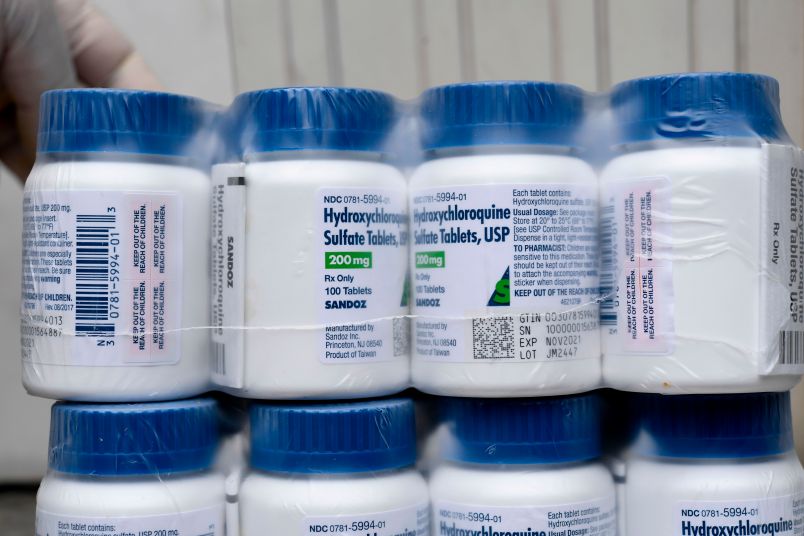A top Trump administration public health official alleged Tuesday that he was demoted after raising concerns about widely distributing a drug that President Donald Trump touted as a potential “game changer” against COVID-19.
Dr. Rick Bright used to be the director of the Biomedical Advanced Research and Development Authority, which is responsible for preparing countermeasures against infectious disease and is a key agency in the fight against COVID-19.
Bright was recently transferred to a different post at the National Institutes of Health. Bright’s complaint said he stopped receiving a paycheck on April 20 and has not been assigned any responsibilities in his new role.
“Dr. Bright was transferred to NIH to work on diagnostics testing – critical to combatting COVID-19 – where he has been entrusted to spend upwards of $1 billion to advance that effort,” Caitlin B. Oakley, a spokesperson for the Department of Health and Human Services, told TPM Tuesday. “We are deeply disappointed that he has not shown up to work on behalf of the American people and lead on this critical endeavor.”
Bright was removed from BARDA “because his efforts to prioritize science and safety over political expediency and to expose practices that posed a substantial risk to public health and safety, especially as it applied to chloroquine and hydroxychloroquine, rankled those in the Administration who wished to continue to push this false narrative,” a whistleblower complaint posted on his lawyers’ website alleged Tuesday.
The complaint requested that Bright’s move to NIH be stayed pending an Office of Special Counsel investigation of his allegations.
The disease expert alleged in a statement after his demotion that he had been moved for political reasons. But the 89-page whistleblower complaint put narrative meat on the bones of Bright’s allegations. The Department of Health and Human Services didn’t immediately respond to a request for comment on the complaint.
According to the complaint, the White House and Health Secretary Alex Azar passed down a directive in March to make millions of donated chloroquine pills “widely available to the American public,” in the complaint’s words, despite a lack of clinical evidence supporting their efficacy.
Bright and others were wary of the directive, the complaint alleged, and instead submitted an application for an “emergency use authorization” from the FDA, which would limit how widely the donated pills were distributed.
“Implementing the EUA was a compromise position, to rein in HHS leadership’s initial campaign to make the drugs available to the public outside of a hospital setting and without physician supervision,” the complaint alleged.
The FDA ultimately did issue an emergency use authorization to distribute the donated pills. The EUA was limited to hospitalized patients who didn’t have access to a clinical trial of the drug. And even then, the authorization drew criticism from public health experts who thought it wasn’t backed by enough evidence.
Even after the EUA, Bright’s complaint alleged, senior Trump administration officials including members of the White House Coronavirus Task Force pushed for the drugs to be distributed more widely. After Bright leaked emails to a journalist that illustrated this push from the Trump administration, he was suspected as the source within HHS, the complaint alleged.
“HHS leadership, including Secretary Azar and Dr. Kadlec, were already gunning for Dr. Bright’s removal because of other issues he had raised about fraud, waste, and abuse, but they chose to remove him as BARDA Director within days of publication of the article about chloroquine because they suspected that he was the source,” Bright’s complaint alleged.
Bright’s lengthy allegation discussed more than just his concerns over hydroxychloroquine, and details a long-simmering tension with higher-ups at the Department of Health and Human Services — specifically Dr. Robert Kadlec, HHS’ assistant secretary for preparedness and response — over the administration’s failure to prepare for the COVID-19 pandemic. Bright alleged that he pressed Azar and Kadlec in late January to better fund efforts to prepare for the pandemic, but that his comments “were met with skepticism and were clearly not welcome.”
Bright also singled out John Clerici, a pharmaceutical industry consultant with a connection to Kadlec. Among other things, Bright alleged that Clerici and staff in Kadlec’s office pressured him to extend a contract to a client of Clerici’s. The company’s CEO was “friends with Jared [Kushner],” Bright alleged that Clerici told him.
Read Bright’s complaint here.
This post has been updated.



